 MyDogBreeds
MyDogBreeds Red Heeler is originated from Australia but Beauceron is originated from France. Red Heeler may grow 20 cm / 7 inches shorter than Beauceron. Red Heeler may weigh 34 kg / 74 pounds lesser than Beauceron. Both Red Heeler and Beauceron has almost same life span. Both Red Heeler and Beauceron has almost same litter size. Both Red Heeler and Beauceron requires Low maintenance.
Red Heeler is originated from Australia but Beauceron is originated from France. Red Heeler may grow 20 cm / 7 inches shorter than Beauceron. Red Heeler may weigh 34 kg / 74 pounds lesser than Beauceron. Both Red Heeler and Beauceron has almost same life span. Both Red Heeler and Beauceron has almost same litter size. Both Red Heeler and Beauceron requires Low maintenance.
 Known also as the Australian Cattle Dog, the Red Heeler is also known as the Blue Heeler. This is a breed of herding dog originally developed in Australia.
Known also as the Australian Cattle Dog, the Red Heeler is also known as the Blue Heeler. This is a breed of herding dog originally developed in Australia.
These dogs are known for their stamina and resilience with driving cattle over long distances in hot weather and across rough terrain.
It was George Eliott who developed the Red Heeler – crossing native Dingoes with Collies and other herding dogs.
In America, the breed was fully recognised in September 1980.
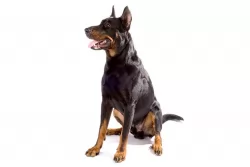 Sometimes referred to as the king of sheepdogs, the Beauceron is a French dog breed that happens to be an extraordinary herding dog too. He instinctively rounds up livestock without even being trained to do so. The dog is also known as Berger de Beauce, originating from the Beauce region in France and is closely related to the Briard or Berger de Brie.
Sometimes referred to as the king of sheepdogs, the Beauceron is a French dog breed that happens to be an extraordinary herding dog too. He instinctively rounds up livestock without even being trained to do so. The dog is also known as Berger de Beauce, originating from the Beauce region in France and is closely related to the Briard or Berger de Brie.
This French breed’s origin goes back to the late 16th century, and the Beauceron was divided into two working types way back in 1863 - the dog with the long coat was known as Berger de Brie or Briard while the short-coated dog became known as Beauceron. It was in 1922 that a club for this dog breed was established, and the Beauceron Club of America was established in 1980, only recently receiving recognition by the American Kennel Club.
 The Red Heeler is a medium-sized dog standing at between 43 to 51 cm in height and weighing in the region of 14 – 16 kg.
The Red Heeler is a medium-sized dog standing at between 43 to 51 cm in height and weighing in the region of 14 – 16 kg.
He is muscular, with a sturdy build. The coat of this robust dog is shortish and thick and quite often you’ll find a white star marking on he forehead. The coat is a blue-grey color or reddish. The tail of this dog is long and the ears are erect.
The Red Heeler has always been a working dog so he is energetic and lively, being independent and strong-willed.
He is super intelligent too and can be easily trained and socialized. He is a dog that simply loves the outdoors and if you don’t live on a farm, he is going to need lots of exercise.
He gets on well with kids and other pets, but children should be taught to respect him and be kind towards him, otherwise he might not tolerate them. He is a loyal, protective dog, wanting to ensure the safety of his human family.
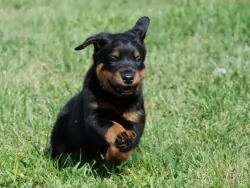 The Beauceron is an intelligent dog, just by looking at the alert, bright face. He is a muscular, large dog breed, standing up to 71cm in height and weighing in at up to 50kg. You’ll recognize him with his dark black coat with red markings, particularly around the feet, which interestingly gives this breed the French nickname Bas Rouge. It means red stockings. Harlequin, tri-coloured grey, black and tan is also recognized as a color.
The Beauceron is an intelligent dog, just by looking at the alert, bright face. He is a muscular, large dog breed, standing up to 71cm in height and weighing in at up to 50kg. You’ll recognize him with his dark black coat with red markings, particularly around the feet, which interestingly gives this breed the French nickname Bas Rouge. It means red stockings. Harlequin, tri-coloured grey, black and tan is also recognized as a color.
The coat is rough, short and dense, the alert eyes dark brown and the ears are set high and can be cropped or natural. The natural ears are half pricked or drop ears and are fairly short. Looking similar to the Doberman and Rottweiler but with a long tail, this French Shepherd dog is somewhat slimmer but with a foreboding appearance. He is solid, well proportioned and well muscled and gives the impression of strength. He has a tolerant nature and will fit in well with a family when trained and socialized.
 When you bring a Red Heeler into your home, you must know that you’re never going to have a dull moment. They’re not content to lie around with nothing to do. These popular dogs literally coax you to come out and to be active.
When you bring a Red Heeler into your home, you must know that you’re never going to have a dull moment. They’re not content to lie around with nothing to do. These popular dogs literally coax you to come out and to be active.
Red Heelers need lots of activities and lots of room, so they aren’t particularly suited to life in the city. Large properties and plenty to do is what they ask for.
Your Red Heeler is going to make a splendid pet, loyal and devoted, the perfect example of man’s best friend.
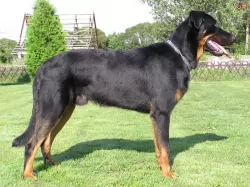 Strong, big, confident and good-looking the Beauceron makes an excellent watchdog, guarding the human family that he is so devoted too. He is a good friend and companion and is tolerant with children and other pets.
Strong, big, confident and good-looking the Beauceron makes an excellent watchdog, guarding the human family that he is so devoted too. He is a good friend and companion and is tolerant with children and other pets.
He is such a clever breed too, and its small wonder that he has always been sought after for hard work – herding, shepherding and even rescue work. When he’s not involved in working, at home, he’s just your big, devoted friend.
 Your Red Heeler can live to be 15 years of age with good care. Every dog however, can fall prey to some of the many common dog diseases there are, some of which can be -
Your Red Heeler can live to be 15 years of age with good care. Every dog however, can fall prey to some of the many common dog diseases there are, some of which can be -
There are quite a lot of congenital and inherited musculoskeletal disorders in dogs, with some of the more common ones being hip dysplasia and muscular dystrophy for instance.
There are some of these musculosceletal problems which can be fatal. Some of the typical symptoms you’ll see with these problems are difficulty climbing stairs or jumping, loss of muscle mass in the hind limbs, arthritis and lameness.
The retina of the eye is that light-sensitive part and which is part of the central nervous system. With retinal degeneration, the cells decline, leading to impaired vision and sometimes even blindness.
Some symptoms to look out for include dilated pupils, night blindness and the inability to see clearly in bright light. The disease worsens over times with sudden blindness being quite common with older dogs. Your vet will want a thorough history of your dog’s health.
Other dog diseases to be very aware of are cancer, obesity, bloat, hip dysplasia and epilepsy.
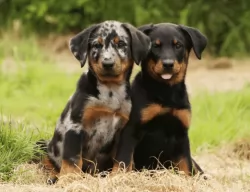 It’s such a nice strong, good-looking dog this, you can’t think of anything going wrong with him. His lifespan is anything from 10 to 14 years and the dog is pretty robust. Being a large breed and a pedigree, he is prone to some common ailments. When you suspect your beloved pet has any health issue, don’t hesitate to get him to the vet.
It’s such a nice strong, good-looking dog this, you can’t think of anything going wrong with him. His lifespan is anything from 10 to 14 years and the dog is pretty robust. Being a large breed and a pedigree, he is prone to some common ailments. When you suspect your beloved pet has any health issue, don’t hesitate to get him to the vet.
A painful disorder that affects larger dogs and brought about by an abnormal development in the joints.
Also a painful condition where the stomach twists so that the blood supply is cut off. Large breeds with deep chests are more prone to developing the condition. Rapid breathing and signs of pain can be indicative of this ailment.
 The Red Heeler is an active dog, and apart from walks which will give him the chance to sniff around, he will need lots of other forms of exercise. Rope pulling games he’ll love and running after a ball will please him because it takes him back to days when he used to run around and herd livestock.
The Red Heeler is an active dog, and apart from walks which will give him the chance to sniff around, he will need lots of other forms of exercise. Rope pulling games he’ll love and running after a ball will please him because it takes him back to days when he used to run around and herd livestock.
If you’re an outdoorsy type of person who loves hiking in the wilds and swimming in rivers, you can count this dog in.
You can look at the Red Heeler as a low maintenance dog. He does shed, but a good brush of the coat twice a week will be excellent for him. If he doesn’t wear his nails down naturally, you will need to trim them. Also, while you are brushing him, check his ears and eyes and inside his mouth to make sure he is clear of all infections.
Red Heelers rely on good food for their resilience and stamina, and for convenience it is good to have commercially manufactured dog food as a backup. The best is home-made food which is easy to prepare and totally uncomplicated.
Simply add into one big pot chicken, brown rice or pasta and spinach, sweet potatoes and carrots. This food can all be chopped up, refrigerated and added warmed up and in small portions to your pet's dry kibble once or twice a week. Simple and tasty, your Red Heeler will love it and thrive on it too.
Ensure there is always a bowl of fresh, cool water within his reach.
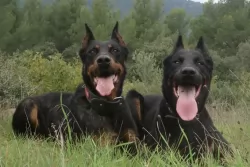 This is a large, hard-working, energetic dog and he will need high-quality food, whether commercially manufactured or home-prepared. The best commercially manufactured dog foods produce foods with the right balance of minerals and vitamins in keeping with your dog’s age, his activities and his stage of life (illness, senior, puppy). If you’re unsure about what to feed your Beauceron, speak to your vet to be 100% that you are meeting his nutritional demands, and always ensure a bowl of cool, clean water is constantly available.
This is a large, hard-working, energetic dog and he will need high-quality food, whether commercially manufactured or home-prepared. The best commercially manufactured dog foods produce foods with the right balance of minerals and vitamins in keeping with your dog’s age, his activities and his stage of life (illness, senior, puppy). If you’re unsure about what to feed your Beauceron, speak to your vet to be 100% that you are meeting his nutritional demands, and always ensure a bowl of cool, clean water is constantly available.
You’re lucky with the Beauceron as he is a low shedding, low maintenance dog with his short coat. He doesn’t require any trimming but will need a good brush twice a week to rid him of loose hairs. Clean his teeth with a special dog toothbrush and toothpaste to avoid plaque buildup. Never use human toothpaste. Clip his nails if he doesn’t wear them down naturally.
This is a big, strong, energetic dog, and you owe it to him to ensure he gets lots of exercise – runs, walks and ball games. If you can’t be a responsible dog owner, don’t own a breed like this as he can become destructive if not kept active.